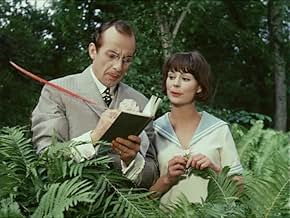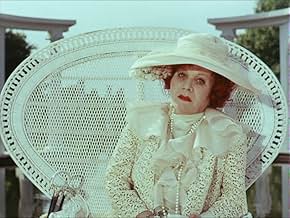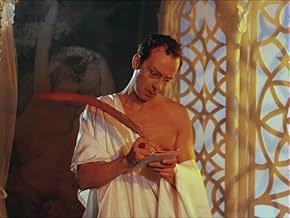Para Não Falar de Todas Essas Mulheres
Título original: För att inte tala om alla dessa kvinnor
AVALIAÇÃO DA IMDb
5,4/10
2,7 mil
SUA AVALIAÇÃO
Adicionar um enredo no seu idiomaA critic blackmails a famous musician with his biography filled with the revelations of many of his women.A critic blackmails a famous musician with his biography filled with the revelations of many of his women.A critic blackmails a famous musician with his biography filled with the revelations of many of his women.
- Direção
- Roteiristas
- Artistas
- Prêmios
- 1 indicação no total
Jan Blomberg
- English Radio Reporter
- (não creditado)
Lars-Owe Carlberg
- Driver
- (não creditado)
Axel Düberg
- Man in Black
- (não creditado)
Doris Funcke
- Waitress
- (não creditado)
Göran Graffman
- French Radio Reporter
- (não creditado)
Yvonne Igell
- Waitress
- (não creditado)
Ulf Johansson
- Man in Black
- (não creditado)
- Direção
- Roteiristas
- Elenco e equipe completos
- Produção, bilheteria e muito mais no IMDbPro
Avaliações em destaque
This comedy, most notable for being Bergman's first film in color, is often considered one of his worst. I went into it with very low expectations, glad that it was just 80 minutes long. Thankfully, it's not nearly as bad as its reputation. It's minor Bergman, for sure. It's main crime is that it thinks it's much funnier than it ever is. That can be annoying, but, really, the film isn't exactly unfunny. Personally, I think Bergman only did comedy right once, with Smiles of a Summer Night, and even that one I don't think is amongst his best work. Simply put, Bergman excels at tragedy, and his comedy can feel forced. This film revolves around an art critic (Jarl Kulle, Bergman's most mugging actor) who comes to write a biography of a famous cellist at his palatial estate. The cellist (whose face never appears on screen) is a philanderer, surrounding himself with women of various ages (including Bibi Andersson, Harriet Andersson and Eva Dahlbeck). Kulle starts a fling with Bibi Andersson, and soon discovers that one of the wives or mistresses is attempting to murder the cellist. The Bergman film this reminds me most of is The Devil's Eye, which also stars Kulle (if I recall correctly, that one is slightly less comic). The color cinematography is actually quite excellent. Bergman didn't film again in color until Cries and Whispers. This is available on Hulu Plus.
I agree that "All These Women" is misunderstood, especially if you look at it in the context of Bergman's filmography. He had just completed the "Silence of God" trilogy, one of the deepest, most serious works in the history of cinema. So, cut the man some slack and allow him his lark, his goof, his chance to riff on fans and critics and the illusion of the exalted artist (himself), before returning to his true work with his next film, the universally praised "Persona."
I also think he was a little influenced by "8 1/2" which had come out the year before, appreciating Fellini's playfulness as well as his insight into the creative process and, of course, "all these women." Bergman will always be thought of as a somewhat austere and oft despairing artist, but thankfully we have several films that belie that, like "Smiles of a Summer Night," "The Magician," and this little oddball gem.
I also think he was a little influenced by "8 1/2" which had come out the year before, appreciating Fellini's playfulness as well as his insight into the creative process and, of course, "all these women." Bergman will always be thought of as a somewhat austere and oft despairing artist, but thankfully we have several films that belie that, like "Smiles of a Summer Night," "The Magician," and this little oddball gem.
Amazing that this film is on DVD. I saw it in 1967 (in suburban Sacramento of all places) and have never seen a trace of it since.
It is a fairly terrible movie, but it does have its place in Bergman's movies. Swedish reviewers at this point in his career were among his severest critics, and this movie was his response. It should have been deft and ironic but, as I think we're all aware by now, Bergman is not exactly over-burdened with a sense of humor. I suppose he also thought color as something of a joke at that time, which might explain some of the very ugly effects.
I can't really recommend the movie but it does give some insight into Bergman, so I rank it a little higher than the other reviewers.
P.S. And I thank Anders, the foreign exchange student from Stockholm at my high school, for making me see this movie and who filled me in on the info about Bergman and the critics. He too thought it a lousy movie.
It is a fairly terrible movie, but it does have its place in Bergman's movies. Swedish reviewers at this point in his career were among his severest critics, and this movie was his response. It should have been deft and ironic but, as I think we're all aware by now, Bergman is not exactly over-burdened with a sense of humor. I suppose he also thought color as something of a joke at that time, which might explain some of the very ugly effects.
I can't really recommend the movie but it does give some insight into Bergman, so I rank it a little higher than the other reviewers.
P.S. And I thank Anders, the foreign exchange student from Stockholm at my high school, for making me see this movie and who filled me in on the info about Bergman and the critics. He too thought it a lousy movie.
It's taken a few goes, but I have finally discovered that I can dislike a Bergman film. Perhaps Swedish humour shares some characteristics with Danish humour which tends to leave me cold and perplexed.
Several years on, I still cannot get the cheesy, syncopated version of "Yes, We Have No Bananas" out of my head.
The cast try their best but the material is beyond redemption. in fact, this cast does not include the best Bergman people anyhow.
This film simply is not at all funny nor is it interesting once you get 10 minutes in.
It is merely irritating.
This film is a lemon.
Several years on, I still cannot get the cheesy, syncopated version of "Yes, We Have No Bananas" out of my head.
The cast try their best but the material is beyond redemption. in fact, this cast does not include the best Bergman people anyhow.
This film simply is not at all funny nor is it interesting once you get 10 minutes in.
It is merely irritating.
This film is a lemon.
I never thought that I would have to say that but I did not like the Ingmar Bergman's film "All These Women". In spite the very pretty and delicate pink and blue cinematography and the presence of the charming and talented actresses, the movie was a mess of an attempt to create a comedy. Everything that was subtle, sensual, and charming in B/W "Smiles of a Summer Night" (1955) was missing here. First of all - the Jarl Kulle's performance as a music critic - biographer, Cornelius. Kulle was very effective and funny in "Smiles...", in "Women..." - he plays an irritating, annoying, and the worst - absolutely not funny (which is a crime for a comedy) character. If in "Smiles... the writing was a first class and sparkled, I got the impression that in "Women.." Bergman did not care or did not want to work on the script and was more interested in experimenting with colors and music. The movie looks and sounds fine - it is Bergman, after all, but that's the only redeeming qualities that I found.
4/10
4/10
Você sabia?
- CuriosidadesThis is Ingmar Bergman's first color film.
- Cenas durante ou pós-créditosThe disclaimer at the beginning states that: "Every similarity between this film and the so-called reality has to be a misunderstanding".
- Trilhas sonorasOrchestral Suite No. 3 D-dur (BWV 1068)
Composed by Johann Sebastian Bach
Principais escolhas
Faça login para avaliar e ver a lista de recomendações personalizadas
- How long is All These Women?Fornecido pela Alexa
Detalhes
- Tempo de duração1 hora 20 minutos
- Mixagem de som
- Proporção
- 1.37 : 1
Contribua para esta página
Sugerir uma alteração ou adicionar conteúdo ausente

Principal brecha
By what name was Para Não Falar de Todas Essas Mulheres (1964) officially released in India in English?
Responda































